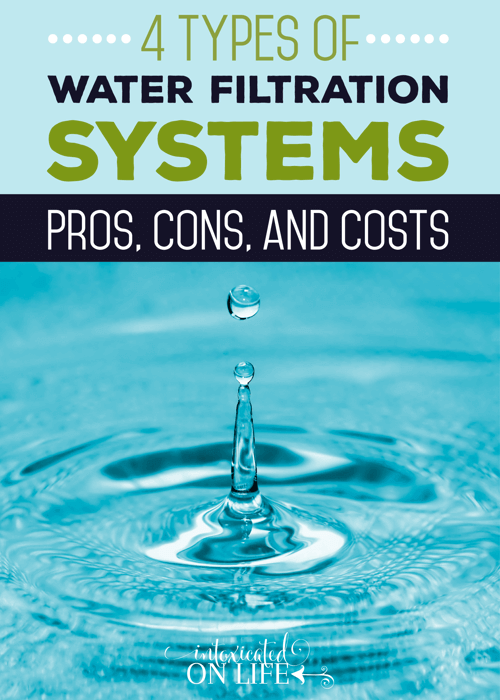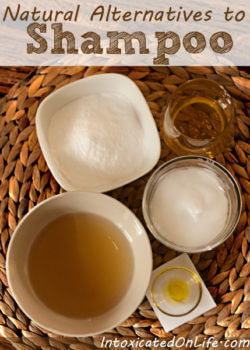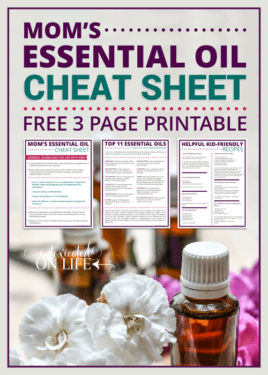Today we’re going to compare and contrast 4 types of water filtration systems.
Bacteria, parasites, fluoride, chlorine, emerging pollutants…just a few of the reasons why you may be considering a water filtration system. Yuck!
Recently we discussed what could be lurking in your water, both city water and well water. Now, we’re going to tackle the popular water filtration systems and discuss the pros and cons of each type of system.
In addition to the pros and cons, we’ll do a price comparison of these types of water filtration systems. There is obviously some variation depending on brand, set-up, energy cost, and maintenance, but I have estimated (and given a range) as best as I can.
Types of Water Filtration Systems: Pitcher Water Filters
These are fairly popular water filters that you can easily purchase in any grocery store. The filtration happens in the water pitchers and uses granulated activated charcoal to remove contaminants.
Pros:
- Reduced chlorine in water
- Improved water flavor
- Low up-front costs
- Does not remove minerals from the water
Cons:
- The carbon filters is not solid, so it will not remove all contaminants
- Will not remove pesticides, herbicides, heavy metals, fluoride, or emerging contaminants
- Fairly small container for a family, must frequently refill water pitcher frequently
- Requires frequent replacement of cartridge, so may not be the most economical solution in the long-run despite up-front costs
- Unless you are making ice cubes the old fashioned way, you will not have ice made from filtered water.
Cost: $0.13 – $0.34 per gallon
Of course there are numerous brands of pitcher filters you can find, and sometimes you may be able to find the filters on sale.
Types of Water Filtration Systems: Distillation
With this type of water filtration system, distilled water systems bring water to boiling point, where water turns to vapor and is then condensed back into water in a separate chamber. It’s a pretty involved mechanism.
Pros:
- Reduces the heavy metals and fluoride in drinking water
- Kills any bacteria lurking the water
Cons:
- There are many problematic contaminants that are not removed from water because they vaporize at the same or lower temperature as water
- Removes minerals from the water
- Large and expensive to set up
- Not energy efficient
Cost for home unit: $0.30- $0.60 cents per gallon
Cost for gallon jugs from store: $0.89 cents – $1.29 per gallon
Types of Water Filtration Systems: Reverse Osmosis
Reverse osmosis is the type of filtration that had been recommended to my mom by her doctor. This is also the type of water we used for about 6 months. We looked into purchasing a home RO system but decided against it because of the up-front cost and cost of maintenance.
It was more economical for us to purchase gallon jugs of water from the store, though certainly not a very convenient option. As you can see in the picture, we ended up purchasing an inexpensive shelf that could hold a number of gallon jugs so we didn’t have to run to the store every week for refills.
There are different types of reverse osmosis systems. They typically differ based on the number of steps involved. The most comprehensive RO systems are 5-step systems. These 5 steps include filtration through micron filters, carbon filters, and water being pushed through a semi-permeable membrane. The last step that is often not included in home RO systems is treatment with Ultra-Violet light in order to kill bacteria and other organisms.
Pros
- Removes the majority of unwanted contaminants in water including bacteria and other organisms if treated with ultra-violet light
- Home reverse osmosis systems are very convenient. You will typically have a small water faucet set up at your sink specifically designed for drinking water. Often, you can have the system set up to also feed into your ice maker as well.
- Improved water flavor
Cons
- In-home set-ups can be an expensive option. They can cost quite a bit to set up and to maintain as filters need to be replaced frequently and are not cheap.
- Removes minerals from the water
- This system wastes a lot of water. You end up with a lot of water waste compared to filtered water.
Cost for home unit: minimum of $0.15 – $0.97 per gallon
Cost for gallon jugs from the store: $0.19 – $0.35 per gallon
If you need to add a water softener to the mix (as we would have needed to) for a home unit that will increase the per gallon cost substantially.
Types of Water Filtration Systems: Berkey Water Filters
The Black Berkey filtration elements use several media types in the filtration process. Below is a quote from Berkey Water about the black berkey filter:
…several methodologies are utilized by the Black Berkey purification elements. The elements are composed of a formulation of more than a half dozen different media types constructed into a very fine matrix creating millions of micro-fine pores. The pores are so small that pathogenic bacteria, cysts, parasites, sediment and sedimentary minerals are not able to pass through them. The media formulation both “absorbs” some contaminates and “adsorbs” other contaminates. Next, heavy metals ions (mineral molecules) are extracted through an Ion exchange process where they are essentially electrically bonded to the media. Finally, our filter elements are designed such that each water molecule can take several minutes to pass through the filter elements whereas these molecules passing through other filtration systems pass through those filters in literally microseconds. The longer the water molecules are in contact with any media, the greater the removal of the various contaminates.
If you use city water and want fluoride filtered out of your water, you need a second filter for your Berkey, the PF-2. This is what Berkey Water has to say about how this filter works:
The media used to extract the fluoride and arsenic is activated alumina. Since fluoride is a by-product of aluminum production, fluoride has a natural affinity to recombine with activated alumina making it an ideal extraction media…Aluminum can cross the blood brain barrier and cause problems with the brain whereas alumina is inert.
Pros
- Bacteria is filtered to a 99.99999% and viruses to a 99.9999% level.
- Filters chlorine to undetectable levels
- Lead and other heavy metals are filtered up to 95%.
- When the black berkey filter is used in conjunction with the optional PF-2 filter, pretty much all undesirable contaminants are removed including fluoride. In fact, they filter water so well that they are rated by the EPA NSF/ANSI as water purifiers—purifiers greatly exceed water filtration standards.
- Low maintenance systems—no expensive equipment or extra plumbing is required
- Minerals are not removed from the water
- Very affordable. Black Berkey filters will filter 3,000 gallons! Depending on your families water usage, one filter should last you a number of years.
- Berkey filtration systems can be used in emergency situations. They can be used with any type of water including lake or stream water.
Cons
- You must manually refill the chamber, though typically once a day is adequate for our family and it’s an easy chore for a 9-year-old :).
- If you want to remove fluoride from the water you must purchase a separate filter.
- You have to find somewhere on your counter to place it.
- Unless you are making ice cubes the old fashioned way, your ice cubes will not be made of filtered water.
Cost with black berkey filter: $.0.017 per gallon
Cost with black berkey and flouride filter: $.07 per gallon
So…there you have it. The pros, cons, and costs of the major types of water filtration systems. I’d love to hear more about what kind of water filtration you use and why you chose that method!
More Healthy Living Resources:
- Is Your Hand Santizer Safe?
- How to Use Baths to Detox
- The #1 Key Habit that Drastically Changed My Family’s Health
- Simplify Life, Save Time: 5 Amazing Benefits of Going Green











Thanks for hosting, I am #1 (woot!) with a grain-free salmon cake recipe. We’ve had a berkey for 6 year now and love it.
So good to hear from someone who has had one for several years! Glad it stands up over the long-haul 🙂
We have used our Berkey for about 4 years. We are still using the same original black berkey filters but have changed the flouride filters as suggested. I have used it daily for drinking, cooking and for canning. We have run several gallons of water each day when canning and still it is going strong. Wouldn’t drink our rural water system water without the Berkey! Thanks for the filter comparison. I always felt it was the best way to filter our water and you have also shown in this that it is also the cheapest.
You’re very welcome! I’m very happy with our Berkey too 🙂 Glad to hear it stands up through time. We’ve not had ours but a few months.
Is the Berkey an under-the-sink model? How expensive is it to set up? My goal is to get fluoride and chlorine out of our water. I can’t afford a household system, at this time, so am also looking for a shower head filter, which would be effective on fluoride.
One thing to note about the gallon containers: the plastic has so many chemicals which leach right back into the water. I’ve been reading that even the heavy duty ones, used by water companies, leach substances, as well.
Hi Linds,
The Berkey is actually a unit that sits on the countertop that you fill (the containers are made of stainless steel). It’s very inexpensive. To remove the chlorine and fluoride you’d need both the black berkey filter and the PF2. They both last quite a while. I’d love a household filter too, but you’re right…they cost a ton! This has been a very affordable option for us at this point. I hope that helps!
Helen, 4 years is a very long time not to change your Berkey Black filters. Have you at least been wiping them down regularly? I would seriously suggest getting some new filter elements!
Happy Wednesday! I’m sharing how to make lighter, fluffier, whole grain breads without adding white flour or gluten. 🙂
That sounds FANTASTIC! I can’t wait to check it out 🙂
This is very interesting! My brother works for a water softener company and can get us a really great deal on them – still expensive, but something I’ve wanted for years. It softens the water for the whole house (so showers and baths have the yucky stuff removed, too).
What are your thoughts on filtration for these water uses?
And thanks for hosting! 🙂
A water softener doesn’t filter, it just softens hard water. They are often paired with RO water filters, but not often do you filter the whole-home’s water because there is a lot of “waste” water and it takes a LOT of time for water to be filtered via RO filters. Maybe there is another type of filter that your brother’s company pairs with the softeners? I’d love to find out what kind it is!
What a thorough review of water filter options. Thanks for doing the research…you’ve got me thinking!
This week I’m sharing the inspiring story of Russ Crandall, who has a rare autoimmune disease that causes inflammation and thickening of his arteries. He had a stroke at age 24 and open heart surgery at age 26, but his health didn’t start to improve until he switched to the Paleo Diet. I continue to be amazed at the power of food. Have a beautiful week!
Wow! What a story. I’m looking forward to reading it. I’m so inspired by people who have been able to turn around their health by changing their diet.
You should take a look at the katadyn siphon filter. Inexpensive for the amount of time you use it and easy to set up. We have you it for years living in Africa and back in the US.
I haven’t ever heard of that type of water filter. I’ll most certainly look into it though! Thanks so much for bringing that to my attention 🙂
I quit using my Berkey because I thought it removed minerals. I’m glad to hear that it doesn’t. I need to replace the fluoride filters and get it set back up! 🙂
This is one of the reasons I decided to switch from drinking RO water to Berkey filtered water – the Berkey doesn’t remove minerals!
Note that once used Berkey carbon filters have been in storage for six months they are ruined. I don’t know the action involved but that’s what the Berkey website says. Mine were stored for nearly five years (after only having been used for two months initially) and when I tried to use them again the chlorine was obvious (you could smell it) coming through. I wish now I’d tried the red dye test but with the chlorine smell I just have up on them. Because the new filters were going to cost so much I put the Berkey back in storage and got out an unopened Santevia I already owned. A good reason to go the extra expense of ceramic filters when you first buy a Berkey. That said, the ceramic pre-filter on my Santevia needs frequent cleaning or filtration slows dramatically.
Thank you for sharing this info. I didn’t know that. We use our Berkey all of the time to filter our tap water, so we don’t have to worry about this, but it sounds like it’s likely not the best option if you’re only using it periodically.
Great post! Very helpful. I’m pinning for when I’m ready to invest in a water purification system.
Have you looked into a Kangan water system? We have had one for years and love it. The initial cost is high, but only about $100-$125 a year for a new filter and it does so many other things as well.
I’ve not ever heard of the Kangan water system. I’ll have to check it out 🙂
I already use a filter for drinking water, but it would be great to have easy access to filtered, clean water for all water needs!
I can’t imagine living without a Berkey filtration system! They are the best! A friend had one and I soon had one of my own!
We love ours!
We use a Berkey water filter with the optional fluoride filters at our house. We’re on city water, but we’re not confident that by the time it comes out the faucet it’s completely safe to drink, and we don’t want fluoride in our water. The filtered water tastes great, too! We also wanted a filter that we could use for emergencies if necessary, and that’s big reason why we got a Berkey. We’ve had it for about 6 years, and we’re very happy with it.
I just bought our Berkey water filter a week ago and so far love it! I’ve been drinking purified water from the store for about a year, but I know that the plastic leaches out into the water. We have several natural gas wells around our house and we live in an area where fracking has been prevalent. Our well water was tested and had Very high levels of dissolved solids (a lot of Iron) and in particular, Barium (an inflammatory). I am so excited to finally have a water filtration system in my house! The Berkey looks great. I have a side buffet and I set it on that. We got the Royal Berkey with a family of 5 and the water amount has been more than enough. I was surprised by how quickly our water goes through the system. The taste is phenomenal. The only confusion on my part has been having a water softener and how this will affect the filters. I can’t turn off the softener as the rest of my house needs the Iron taken out. I have been getting some water from our outside faucet (which bypasses the softener), but this won’t be convenient during the winter. I live in Northeast Ohio. Anyone have any suggestions about the water softener with the Berkey or should I not be worried about it?
From what I understand, there shouldn’t be any problems using a Berkey with a water softener. Berkey does not remove minerals from the salt. Though, if you have a good water softener there shouldn’t be much salt left in the water (other than what’s naturally occurring in your water). While I’ve read on *some* (not all) of the berkey sales websites that they don’t recommend using it with softened water, it just doesn’t make much sense to me.
If I understand how water softeners work, they are using the salt for ion exchange. That is, they are working to remove the calcium and magnesium from the water using the sodium. The brine solution is washed away after this is done. We certainly wouldn’t enjoy drinking salt water all the time 🙂
We moved a few months ago and now live in a house with a well and so we have a water softener. I’ve not noticed any problems at all with my Berkey since living here 🙂
Can you tell me more about electric water descaler as I have only calcium level issue in my drinking water